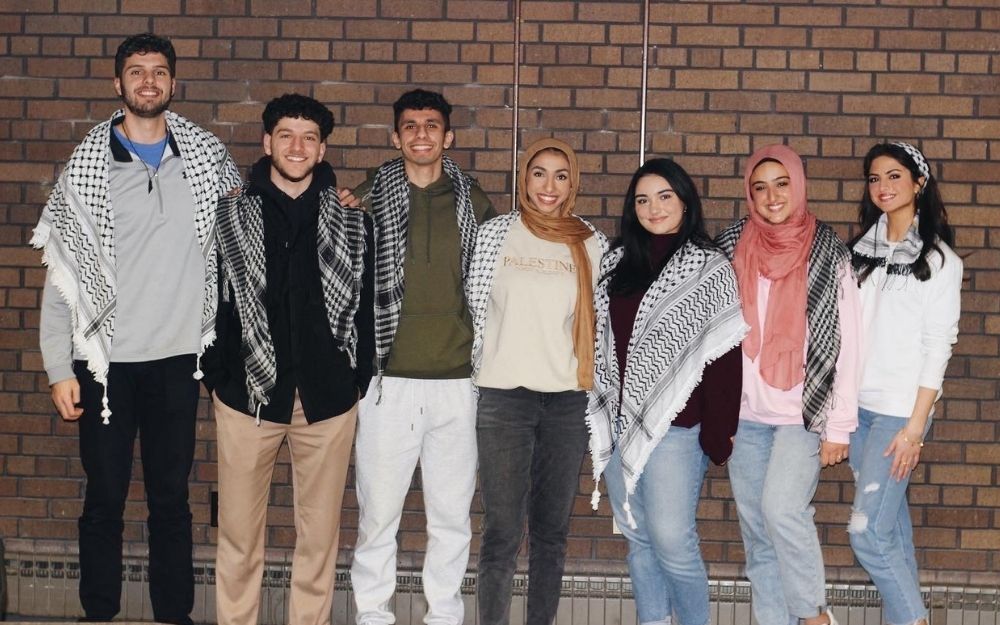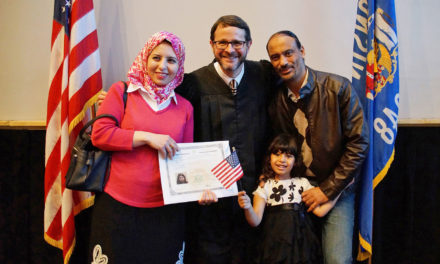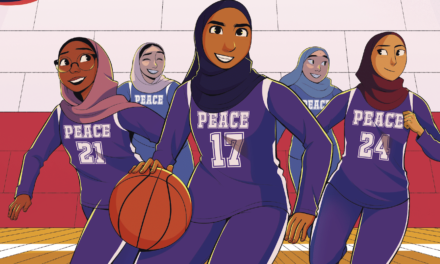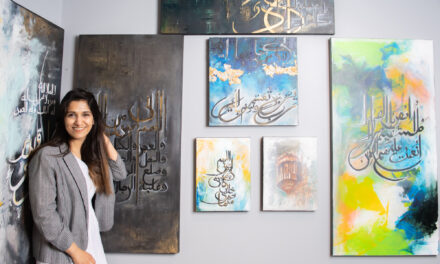University of Wisconsin – Milwaukee’s Students for Justice in Palestine board members (left to right): Mohammad Kaloti, Noah Oweisi, Salam Salous, Jehan Salous, Mariam Mustafa, Janna Zaibak and Gianna Rupnick
Painful loss of friends and family, humiliation of being strip-searched and detained at border crossings, anger at collective punishment and the demolition or confiscation of family homes – these are some of the first-hand experiences shared by the “Understanding Occupation Through Palestinians’ Eyes” panel, hosted Wednesday by the University of Wisconsin – Milwaukee’s Students for Justice in Palestine.
UWM’s SJP organized the event on March 30, “Land Day.” Palestinians and their allies commemorate Land Day worldwide “as a tribute to those who have fallen while trying to hold on to their land,” said Jehan Salous, president of UWM’s SJP chapter. It began as a tribute to six Israeli Arabs who were shot and killed while participating in peaceful protests against the expropriation of Arab-owned land in northern Israel to build Jewish communities, she said. “It is important to honor the struggle and support the movement toward Palestinian liberation.”
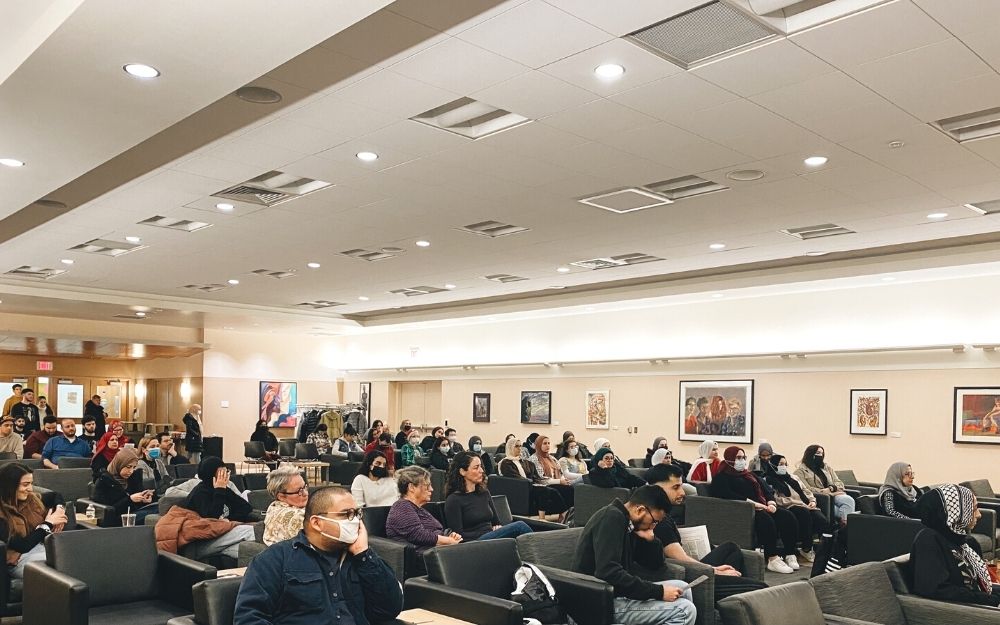
UWM Student Union’s Fireside Lounge filled with students and community members who came to hear Palestinians’ personal stories of life under occupation.
More than 75 people attended Wednesday’s event in the UWM Student Union in Milwaukee from 6 – 8 p.m. A diverse panel of Palestinian Americans, scholars and human rights advocates with experience in the Palestinian territories shared narratives of life under occupation.
“Their stories were their own personal experiences, not fiction,” Salous said. “We were able to hear from some who have paid the heaviest price, the Palestinians themselves. We also heard from people who have lived with displaced Palestinians who witnessed their continued suffering.
“Dr. Robert Ashmore, a long-time advocate for Palestinians, completed our program by providing documentation from recent reports by humanitarian organizations and calling us to action.” He advocated joining organizations that support human rights and Palestinian self-determination.”
Amnesty International published a report in February titled “Israel’s Apartheid Against Palestinians: Cruel System of Domination and Crime Against Humanity,” which equates Israeli practices in Israel and the occupied territories to apartheid.
In 2021, Human Rights Watch released “A Threshold Crossed” that found Israeli authorities are “committing the crimes against humanity of apartheid and persecution” and cited “grave abuses” against Palestinians living in the occupied territory, including East Jerusalem.
“It is amazing to see these leading human rights organizations standing with the Palestinians,” Salous said. “And having students on campus in other organizations supporting us and coming to our event, to have a diverse audience come to hear from our panel, seeing others here in support, gives us hope.”
UWM’s Students for Justice in Palestine
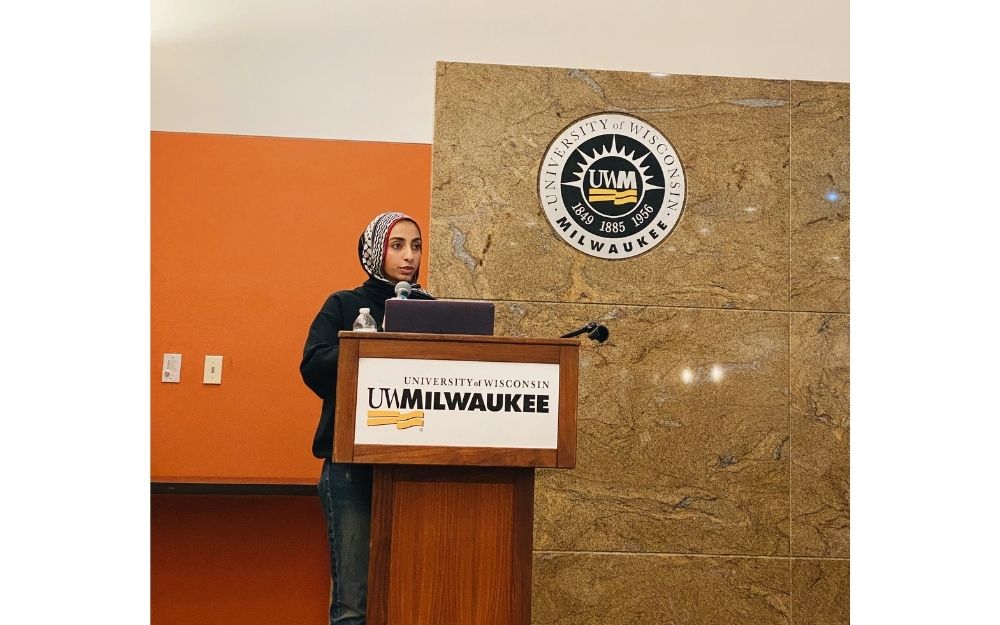
Junior Jehan Salous, president of UWM’s chapter of Students for Justice in Palestine, says she draws hope from students and members of the community who show support.
UWM’s SJP includes about 50 students and community members dedicated to promoting justice, human rights, liberation and self-determination for the Palestinian people, Salous said. Members include students, faculty and staff of a wide variety of ethnic backgrounds, united in their support of Palestinians’ rights.
Salous, a junior who is graduating this spring (in three years), has attended SJP activities since she was a high school student. SJP has been very active this year after two years of minimal activity due to the pandemic, she said. She credits a strong board for developing an active program this academic year.
“Our mission is to advocate for and raise awareness about the plight of Palestinians,” she said. “Our focus is on providing educational and informational programs to discuss human rights issues and Palestinian’s need for self-determination.
“We are excited by the opportunity we have to present this panel,” Salous said about the Land Day presentation. She said she hopes the audience realizes the stories they heard were not unusual. “These are everyday things for the Palestinians.”
Personal Stories
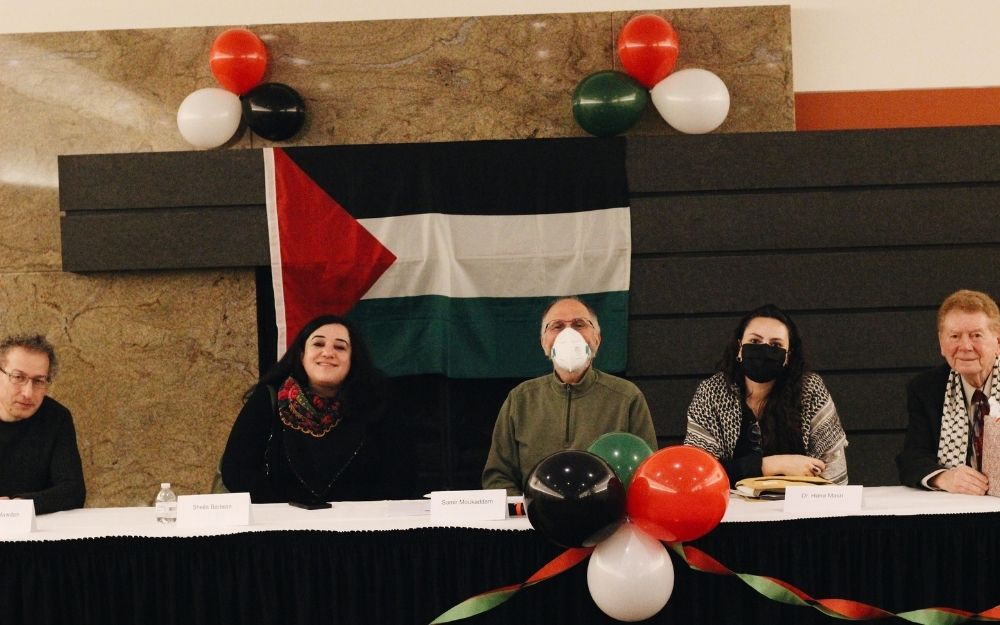
Panelists (left to right): Haitham Salawdeh, Sheila Badwan, Samir Moukaddam, Hana Masri and Robert Ashmore
The program began with a video presentation from a Palestinian refugee from Gaza. He sent the video at SJP’s request. He blamed the occupation for the death of two of his siblings and his friend. His eldest brother was shot in 2004 by the Israeli army before his 18th birthday during an incursion into a refugee camp in Gaza, he said. “My brother was left to bleed on the ground until he passed away. Medics were not allowed to provide any medical help.”
His friend died in 2014 on the roof of his home, hit by “a random Israeli shell,” he said. “He was the best goalkeeper in our UNRWA school.”
His sister died at 26 after she was unable to receive medical treatment in time due to delays in receiving a medical permit allowing her to leave the territory, he continued. “The story of my sister is not unique in the sense that there are hundreds of Palestinian people, many with chronic illnesses, who lost their lives because of they were denied permits to access medical care that is not available in Gaza.”
He described what he said is “normal” for Palestinians in Gaza: “Drones hovering overhead 24/7, lack of electricity and clean water, collective punishment, military operations where houses are leveled and infrastructure destroyed. With the media coverage of the Russian invasion into Ukraine, one can speak of the injustice and bias in the coverage (that ignores what is happening to Palestinians),” he said. “The world watches in silence as Palestinians are losing their lives and living under siege.”
Haitham Salawdeh of Milwaukee shared two personal experiences. His father worked and saved for years to build a house. It was confiscated by the Israeli military when it was newly finished and kept it for five years while used as a prison for Palestinian youth who participated in the first intifada (uprising).
Salawdeh, an activist with the U.S.-Palestinian Community Network, also talked about the tragic deaths in 2015 of his relatives in Duma in the West Bank. Israeli settlers fire bombed their house, killing 18-month-old Ali and his parents who later died of their injuries, he said. Ali’s 4-year-old brother was the only survivor but he has suffered through many surgeries and medical treatments since, Salawdeh added.
“What is in dispute are not the facts but the value,” he said. “Does the world value Palestinian lives or not?”
Sheila Badwan, a Palestinian American who grew up in the United States, went with her family to visit relatives in the West Bank every summer. She shared both personal experiences and those of family members.
Her sister-in-law, a Palestinian, had been a dentist in Germany when she married an Israeli Arab and moved to the 1948 area. By Israeli law, she was not allowed to have citizenship. As a result, she has not been able to practice her profession or drive, and she has to renew her residency every two years. Her four children and her husband have Israeli citizenship. “It has been a struggle for her,” Badwan said.
“Another experience I want to talk about is my cousin who made national news,” Badwan added. “He was a student at Birzeit University. He was only 19 when he was shot and killed in our village. The Israeli army claimed he was throwing rocks.”
Badwan personally experienced a bit of what life as a Palestinian under occupation feels like during her visits, she said. The first was in the early 1990s during the first intifada. She was in Ramallah when the Israeli army used tear gas on a crowd while she was waiting to catch a bus to her village. “I’m not sure if anyone here knows how that feels, but it is something I’ll never forget,” she said.
On another visit, Badwan, 20, traveled with her younger brother to their family’s village. As they were leaving, they were stopped at a checkpoint on their way to the airport in Tel Aviv and forced to go a longer route. Late and afraid they may miss their flight, they faced further delays as Badwan was strip-searched at the airport. Then they were escorted to the plane like someone being deported. “Having grown up in the United States, this treatment was very shocking to me,” she said.
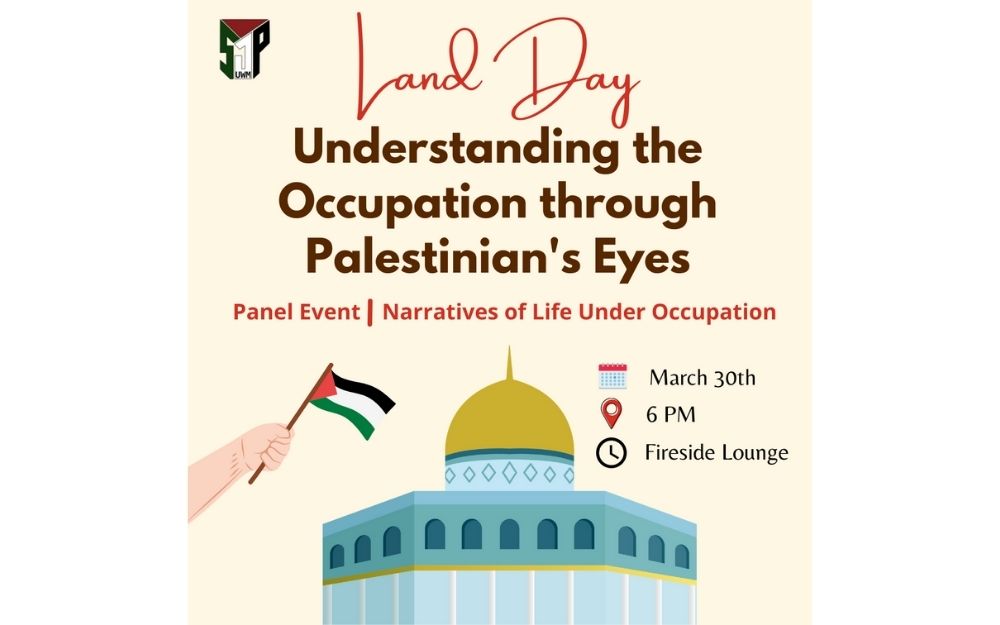
Samir Moukaddam, a computer science professor of Lebanese descent, who grew up in Beirut, Lebanon, teared up as he talked about the challenges Palestinian refugees in Lebanon face. “I haven’t experienced what it means to be stateless, with no passport, living at the mercy of the country where you live. In Lebanon, most Palestinians were never given Lebanese citizenship. It is the worst country for Palestinian refugees.”
Hana Masri, Ph.D., a Milwaukee-based researcher and educator, and an activist with the Palestinian Youth Movement and the Palestinian Feminist Collective, shared her father’s story. In 1982, at 14 years old, he lived in Saida, Lebanon, when Israeli troops invaded. He experienced the sounds of routine bombing of nearby Palestinian camps then an explosion leveled half of the building where his uncle, aunt and cousins lived. He recalled the horror of seeing the half-destroyed building. In the other half, exposed closets revealed neatly stacked towels still in place while relatives lay dead beneath the rubble, she said. Her father fled Lebanon with his family and never lived there again.
Masri recalled her own fear when in 2006 her father was visiting Saida. While the city was again being bombed by Israel, she was unable to reach her father on the phone. He eventually escaped because he had a U.S. passport, she said. As a result of her father’s experiences, “I grew up with a strong sense of solidarity with the Palestinians,” she said.
“I am always in awe of the young people who keep Palestine alive in spite of the huge backlash that we inevitably face,” she added.
A call to action
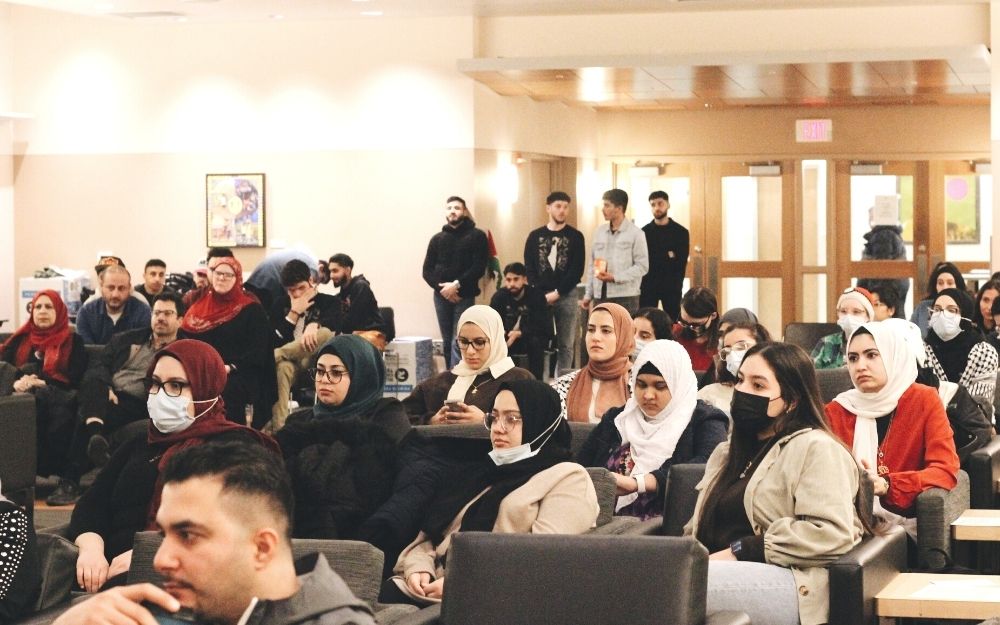
While much is deplorable about the treatment of Palestinians throughout the Middle East, said Robert Ashmore, Ph.D., a Marquette University professor emeritus, “I want to state some positives.
“First of all, there are many Jews who support the Palestinian struggle.” Two of the five human rights reports he discussed were produced by Israeli organizations, B’TSelem and Yesh Din. “Jewish writers and revisionist historians condemn Israel’s historical record and some have fled for their lives or been bombed in their homes.”
Ashmore distributed a list of resources written by Jewish historians and authors as recommended reading for supporters of the Palestinian cause.
He praised Jewish Voice for Peace. “I’m a member. You should join, too,” he said.
“There is an important distinction between Jews and Zionists,” Ashmore said. “You may be a Jew because of your religion or because your mother is a Jew but you are a Zionist if you subscribe to a political agenda of seizing the land of Palestine to the exclusive advantage of those who support apartheid.
“Look at Joe Biden. He said publicly, ‘I am a Zionist.’ You don’t have to be a Jew to be a Zionist. Joe Biden is a hypocrite on human rights.”
Ashmore’s second “positive” is a “big” one, he said. Five major publications have recently condemned Israel as apartheid: Amnesty International, Human Rights Watch, BTSelem, Yesh Din and the Human Rights Council of the United Nations, the last out just out.
Third, representatives in Congress speak out for the rights of Palestinians, he said. Ashmore praised the squad, “six courageous people”: Alexandria Ocasio-Cortez of New York, Ilhan Omar of Minnesota, Ayanna Pressley of Massachusetts, Rashida Tlaib of Michigan, Jamaal Bowman of New York and Cori Bush of Missouri.
Fourth, Ashmore highlighted the votes in the General Assembly of the United Nations. “Although there are 193 nations in the U.N. General Assembly, all but only about five regularly condemn Israel for its human rights violations. And only one country in the Security Council, the United States, uses its veto power to prevent an otherwise unanimous condemnation of Israel. The world is mobilizing against this apartheid regime.”
Ashmore called on the audience to “support those in public life who are fighting on the frontlines for justice and Palestinian human rights.”
He also urged the audience to support organizations “financially and with your labor.” Ashmore recommends the following:
U.S. Campaign to End the Occupation
Amnesty International
Human Rights Watch
B’Tselem USA
Arab American Institute
Arab-American Anti-Discrimination Committee
Jewish Voice for Peace
Refugee Assistance
ANERA
United Palestinian Appeal
